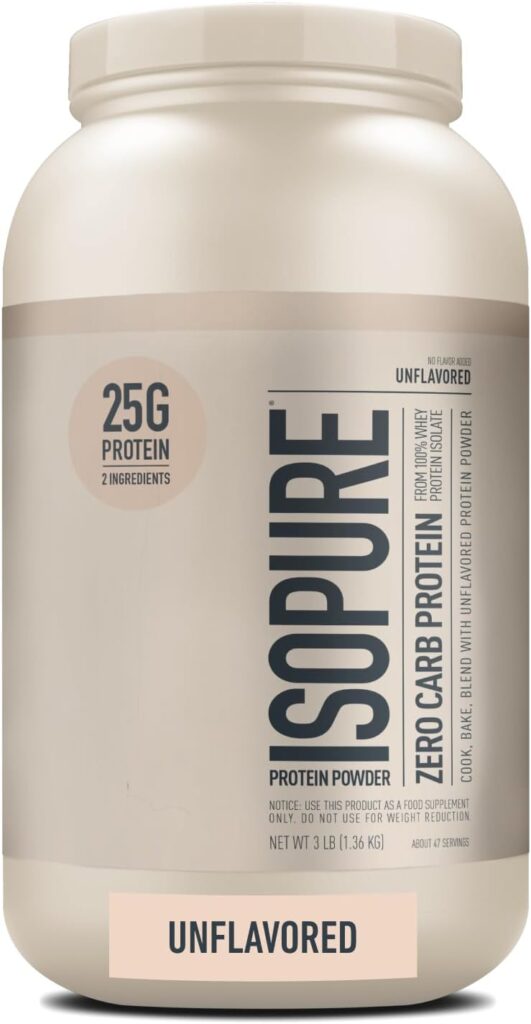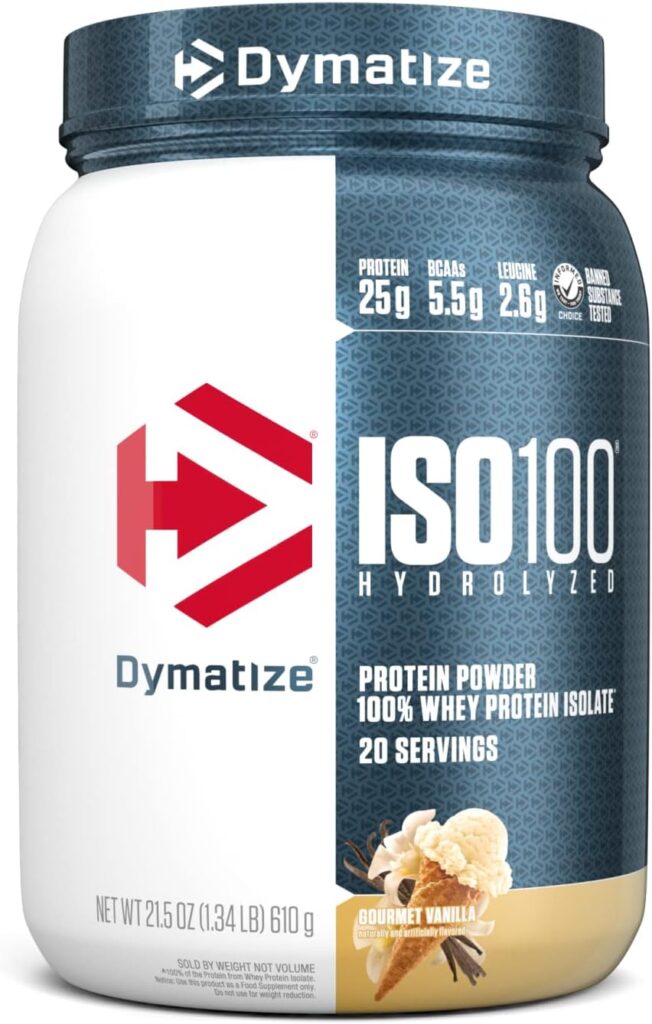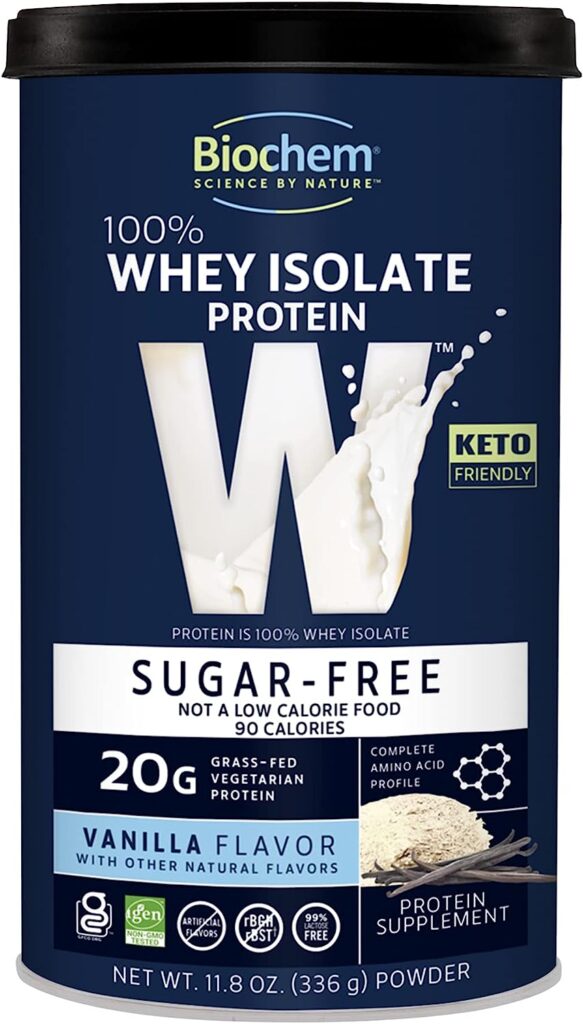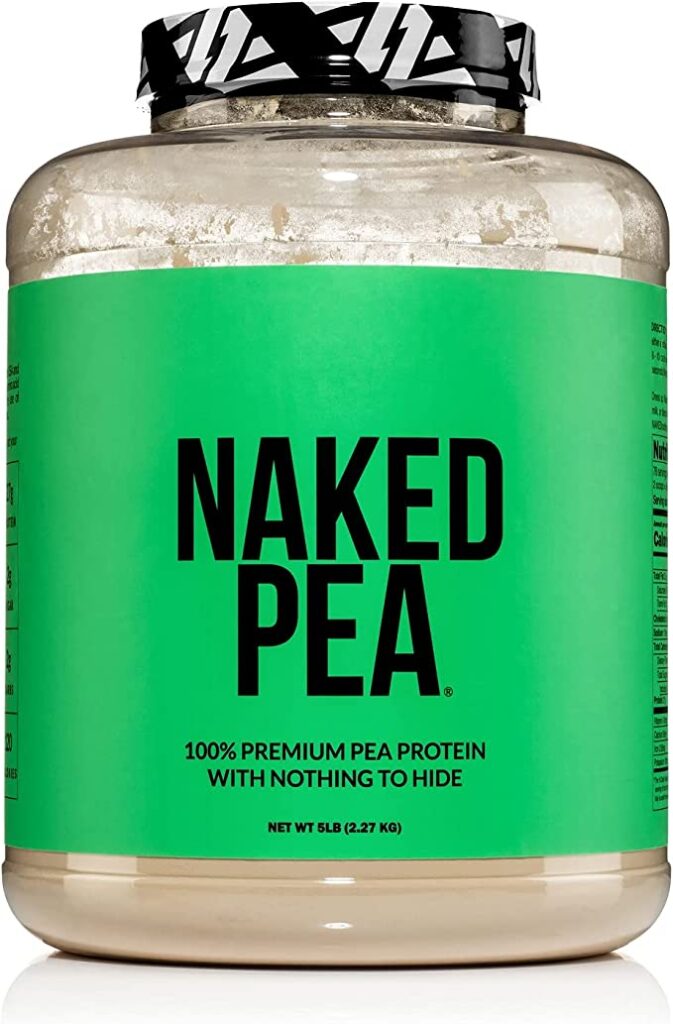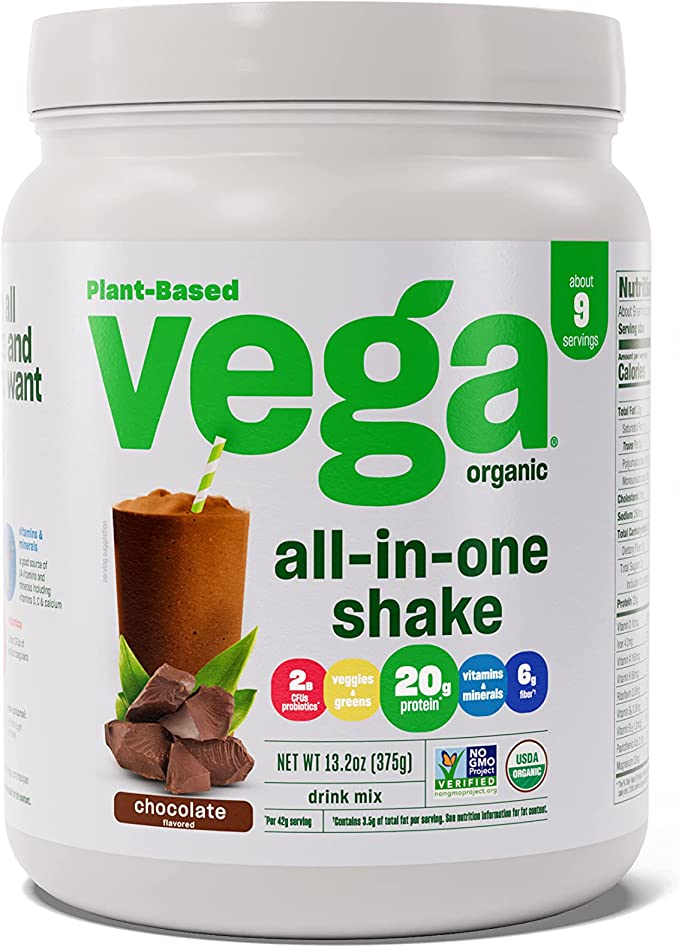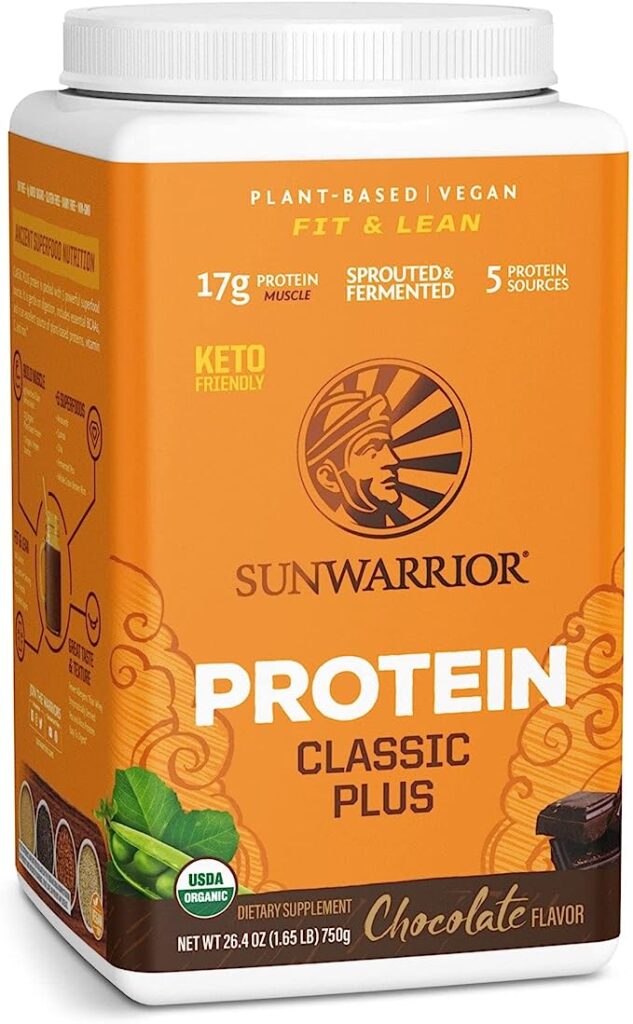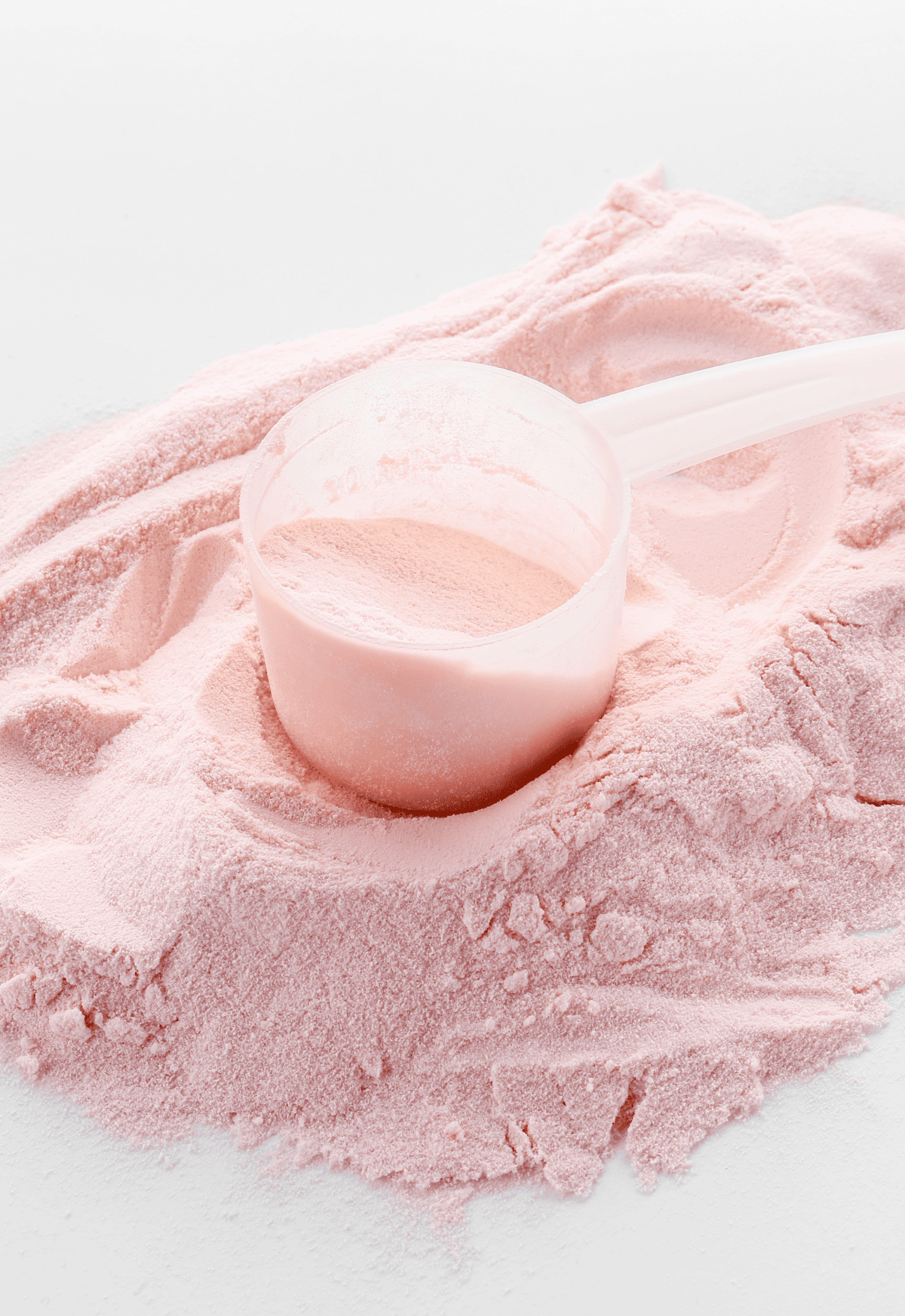
This post is sponsored by the brand, but the opinions I share are unbiased. Read the review disclosure for more information.
You may have found yourself wondering, what is protein powder? Simply put, it’s a nutritional supplement that typically aids muscle growth and recovery.
With so many options available on the market, making informed choices is essential. For those seeking a healthy, natural option, collagen protein powder stands out, providing numerous benefits for the skin.
In this post, I’ll explain everything about protein powders! You’ll learn the following:
- What protein powder is
- The different types of collagen powder and protein powder
- The benefits of collagen protein powder for the skin
- How to use (collagen) protein powder properly
- Which brands to check out for the best (collagen) protein powders
- And more, so make sure to keep on reading!
What Is Protein Powder?
Protein powder is a popular dietary supplement that provides a concentrated source of protein in a convenient and easily consumable form.
It is commonly used by athletes, fitness enthusiasts, and individuals looking to increase their protein intake for various reasons such as muscle growth, recovery, weight management, or general health and wellness.
Protein powders are typically derived from animal or plant sources and undergo various processes to extract and concentrate the protein content. The most common types of protein powders include whey protein, casein protein, soy protein, pea protein, and collagen protein.
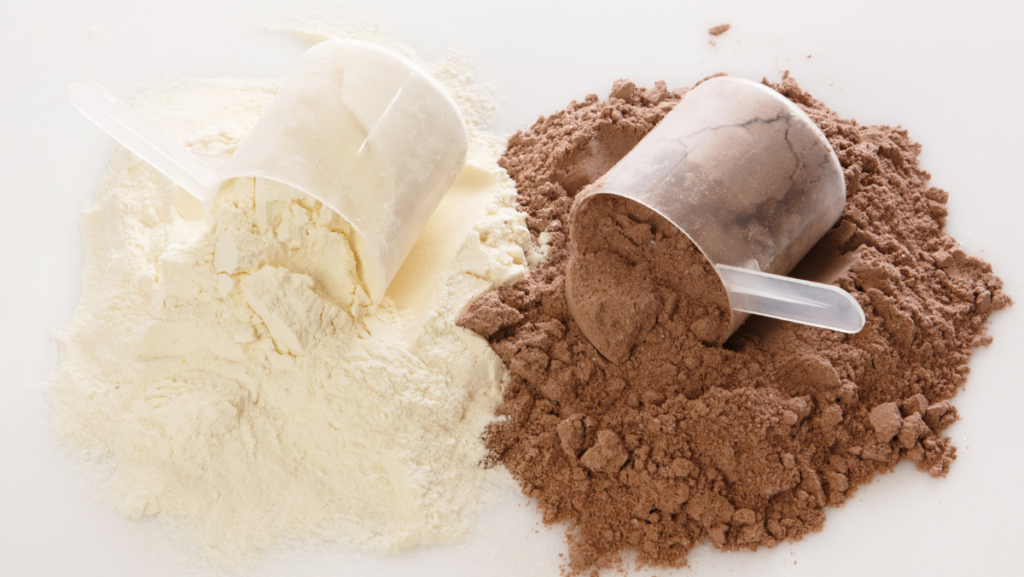
Different Types Of Protein Powder
As I mentioned above, protein powders are not a one-and-done product. There are actually quite a lot of different options on the market! But this might be extra confusing to you, so I will dive deeper into the different options of protein powder and their main features.
Whey Protein
Whey protein is a high-quality protein derived from milk. It is rich in essential amino acids, particularly branched-chain amino acids (BCAAs), which play a crucial role in muscle protein synthesis and recovery.
Whey protein is rapidly absorbed by the body, making it an excellent choice for post-workout supplementation. On top of that, it doesn’t have to be boring in taste because, for example, Naked Nutrition has Whey Protein Powders in the flavors Chocolate, Grape, Fruit Punch, and Vanilla.
Casein Protein
Casein protein is another type of milk protein that differs from whey protein in terms of absorption rate. Casein protein forms a gel-like substance in the stomach, resulting in slower digestion and sustained release of amino acids into the blood vessels.
It is often consumed before bed or as a meal replacement to provide a steady supply of protein over an extended period.
Soy Protein
Soy protein is derived from soybeans and is a complete protein source, meaning it contains all the essential amino acids required by the body.
It is suitable for vegetarians and vegans and has been shown to have comparable benefits to whey protein in terms of muscle protein synthesis and recovery.
Pea Protein
Pea protein is a plant-based protein derived from yellow peas. It is hypoallergenic, easily digestible, and suitable for individuals with dairy or soy allergies.
Pea protein is rich in lysine, an essential amino acid that is relatively low in other plant-based proteins. It has been found to support muscle growth and provide satiety.
Collagen Protein
Collagen protein is unique compared to other protein powders as is derived from the connective tissues of animals, primarily bovine or marine sources. Collagen is the most abundant protein in the body and is a vital component of the skin, bones, tendons, and ligaments.
You can get collagen from foods like bone broth, or you can use a supplement like collagen protein powder. Protein powder with animal collagen is rich in specific amino acids like glycine, proline, and hydroxyproline, which are essential for maintaining healthy skin, hair, and joints, as well as gut and heart health.
I use the Naked Nutrition Ella Collagen Protein Powder in Chocolate, which is yummy and very beneficial! It even contains 100mg of hyaluronic acid, zinc, vitamin C, biotin, and many more powerful ingredients!
Benefits Of Collagen Protein Powder For The Skin
In this post, I would like to talk about Collagen Protein Powder because, as you may know – collagen is a popular skincare ingredient. But does a collagen protein powder have similar results and benefits for the skin too? Here’s what you can expect:
Boosting Skin Hydration
One of the most attractive benefits of collagen protein powder for your skin is its ability to boost skin hydration. Collagen is a key component of the skin’s extracellular matrix, which provides structural support and helps retain moisture.
As we age, collagen production naturally declines, leading to decreased skin hydration and moisture loss. By supplementing with collagen protein powder, you can help boost skin hydration and potentially encourage your body to produce collagen and other agents that will give you a more youthful appearance.
Collagen peptides, the smaller fragments of collagen found in protein powder, are easily absorbed by the body and can penetrate the skin’s deeper layers. This promotes increased water retention to improve skin hydration and elasticity, provide a plumper appearance, and reduce dryness or dullness.
Improving Skin Elasticity
Skin elasticity refers to its ability to stretch and return to its original shape. Collagen plays a crucial role in maintaining skin elasticity by providing structural support and resilience.
Over time, collagen levels naturally decline, leading to a loss of skin elasticity and the formation of sagging or loose skin. Collagen protein powder can help address this issue.
By supplementing with collagen, you provide the body with the necessary amino acids to support collagen synthesis and restore skin elasticity. Regular intake of collagen protein powder may help improve the skin’s ability to bounce back, resulting in a firmer and more youthful appearance.
Reducing Wrinkles and Fine Lines
Wrinkles and fine lines are common signs of skin aging that occur due to a combination of factors, including collagen depletion, decreased skin elasticity, and environmental damage.
Collagen protein powder has been studied for its potential to reduce the appearance of wrinkles and fine lines. When consumed, collagen peptides are broken down into amino acids that are utilized by the body to produce new collagen.
This can help stimulate collagen synthesis, leading to a smoother and more youthful complexion. By replenishing collagen levels, collagen protein powder may help diminish the depth and visibility of wrinkles, resulting in a more youthful and rejuvenated appearance.
Strengthening Skin Barrier
The skin barrier acts as a protective barrier, safeguarding the skin against external aggressors, such as pollutants, UV radiation, and irritants. A strong and intact skin barrier is essential for maintaining skin health and preventing moisture loss.
Collagen protein powder has been found to support the strengthening of the skin barrier. Collagen supplementation can stimulate the production of proteins like elastin and fibrillin, which contribute to the skin’s elasticity and resilience.
By reinforcing the skin barrier, collagen protein powder can help improve its ability to retain moisture, protect against environmental stressors, and promote overall skin health.
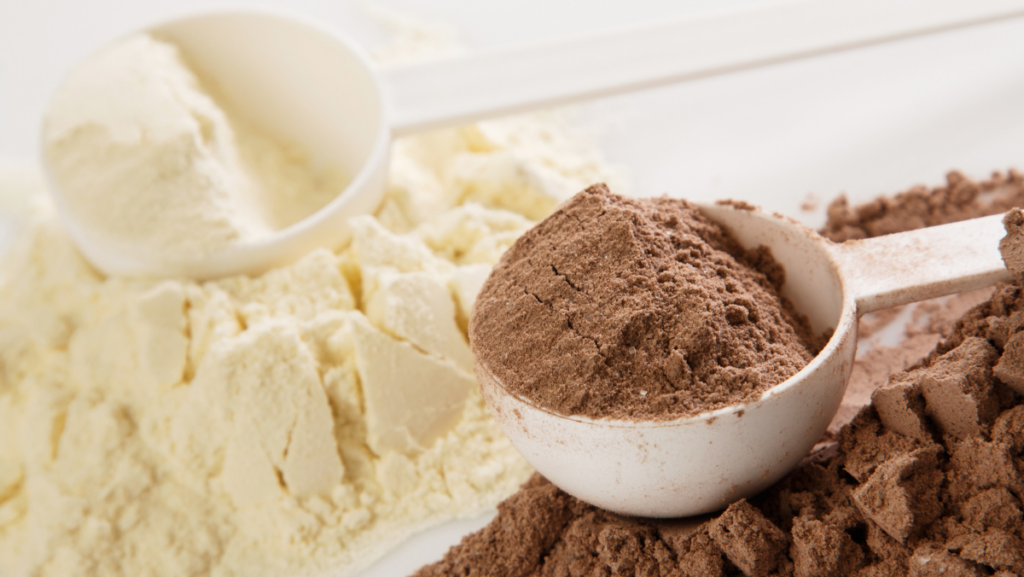
Are There Any Protein Powder Side Effects?
While collagen protein powder has numerous benefits for the skin, it’s essential to be aware of the potential protein powder side effects.
Some individuals may experience allergic reactions, digestive discomfort, or skin breakouts due to the natural processing of collagen.
As with any supplement, it’s important to listen to your body and consult a healthcare professional if you’re unsure whether a collagen protein powder is right for your skincare routine.
Is Protein Powder Safe?
Protein powder is generally considered safe for consumption when used as directed and in moderation. However, it’s important to know certain factors and considerations to ensure its safe use. Here’s a thorough explanation:
The safety of protein powder depends on its quality and source. Choosing reputable brands that adhere to strict manufacturing practices and quality control standards is essential. Look for protein powders that undergo third-party testing to verify their purity and safety.
If you have known allergies, it’s important to read the product label to check for potential allergens carefully. Consider alternative protein sources if needed, such as plant-based options like pea protein or hypoallergenic collagen protein powder.
Some people may experience digestive issues when consuming protein powder, such as bloating, gas, or stomach discomfort. These effects can vary depending on the individual and the specific type of protein powder.
If you have a history of digestive problems or are prone to digestive sensitivity, start with a smaller serving size or try different protein sources to find the one that suits you best.
It’s important not to exceed the recommended daily intake, as excessive protein intake can strain the kidneys and potentially lead to health issues. It’s advisable to consult with a healthcare professional or a registered dietitian to determine the appropriate amount of protein powder for your specific needs and health goals.
Protein powders are intended to supplement the diet and should not replace whole-food protein sources. It’s important to maintain a well-rounded and balanced diet that includes a variety of nutrient-dense foods to ensure you’re meeting your overall nutritional needs.
As with any dietary supplement, it’s important to listen to your body and be aware of any potential adverse effects. If you experience any unusual or severe symptoms after consuming protein powder, discontinue use and consult a healthcare professional.
Does Protein Powder Expire?
Yes, protein powder does have an expiration date. Like many other food products, protein powder has a shelf life and should be consumed before it reaches its expiration date for optimal freshness and safety. The expiration date is typically printed on the packaging of the protein powder.
Over time, protein powder can degrade in quality and effectiveness. Exposure to air, moisture, heat, and light can accelerate this process.
As the powder ages, it may clump, lose flavor, or have a noticeable change in odor. Consuming expired protein powder may lead to reduced potency, potential digestive issues, or even the risk of consuming harmful bacteria.
Storing protein powder properly is important to ensure the best quality and safety. Keep it in a cool, dry place away from direct sunlight, moisture, and extreme temperature fluctuations. Additionally, sealing the container tightly after each use can help minimize exposure to air and moisture.
If you come across expired protein powder, it’s generally recommended to discard it rather than consume it. Using protein powder beyond its expiration date can pose risks to your health and may not provide the desired nutritional benefits.
It’s worth noting that the shelf life of protein powder can vary depending on factors such as the specific formulation, manufacturing process, and storage conditions.
Therefore, it’s important to check the expiration date on the package and follow the manufacturer’s recommendations for storage and usage to ensure the best quality and safety of the product.
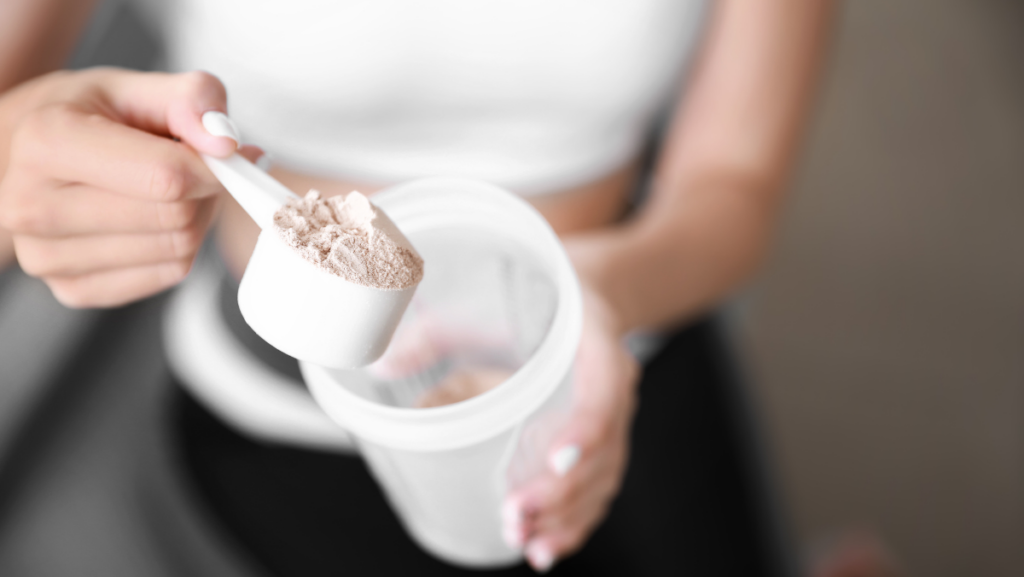
How To Properly Use Protein Powder
To make the most of your protein powder and ensure safe and effective usage, follow these guidelines:
- Read and Follow Instructions: It is essential to carefully read and follow the instructions provided by the manufacturer on the protein powder packaging. Each brand and type of protein powder may have specific recommendations for serving sizes, mixing instructions, and timing of consumption. Adhering to these instructions will help you maximize the health benefits of the protein powder.
- Mixing and Preparation: Protein powders are typically mixed with liquids such as water, milk (dairy or plant-based) or incorporated into smoothies. Follow the instructions provided by the manufacturer for the recommended liquid-to-powder ratio to achieve the desired consistency. You can mix the powder thoroughly with a shaker bottle or blender (or simply stir with a spoon). Adjust the amount of liquid to achieve your preferred taste and texture.
- Timing of Consumption: The timing of protein powder consumption can depend on individual goals and preferences. Some people prefer to consume protein powder as part of a pre-workout or post-workout routine to support muscle recovery and growth. Others may incorporate protein powder into their meals or snacks throughout the day. Consider your specific needs and, if needed, consult with a healthcare professional or a registered dietitian.
Intake Guidelines: How Much Protein Powder Per Day?
Determining the appropriate amount of protein powder to consume daily depends on various factors, including age, gender, activity level, overall diet, and individual goals. Here are some general guidelines:
- Protein Needs: The recommended daily protein intake varies, but a commonly used guideline for healthy adults is approximately 0.8 grams of protein per kilogram of body weight[1] (or about 0.36 grams per pound). However, individuals engaged in intense physical activity, athletes, or those aiming to build muscle mass may require higher protein intake.
- Assess Your Total Protein Intake: Before incorporating protein powder into your routine, assess your overall protein intake from food sources. Protein powders should supplement your diet, not replace whole food sources of protein. Consider your daily protein intake from a combination of lean meats, fish, poultry, dairy products, legumes, nuts, and seeds.
- Individualized Protein Powder Intake: The specific amount of daily protein powder will depend on your total protein needs and dietary preferences. As a general recommendation, aim to consume around 20-30 grams of protein per serving of protein powder. However, it is essential to note that individual requirements may vary.
- Consider Timing and Distribution: If you choose to consume protein powder in multiple servings throughout the day, consider evenly distributing your protein intake across meals and snacks. This can help maximize muscle protein synthesis and support muscle recovery and growth.
Remember, protein powder is a supplement and should be used in conjunction with a balanced diet that includes a variety of nutrient-dense whole foods.
Diet Restrictions: Sugar-Free Protein Powder
If you have any diet restrictions, such as eating sugar-free, and are afraid that you can’t take protein powder? No worries, let me tell you more.
Sugar-free protein powder refers to protein powders that do not contain added sugars. These powders are often preferred by individuals who are conscious of their sugar intake, following a low-sugar or low-carb diet, or managing conditions such as type II diabetes.
Sugar-free protein powders are typically sweetened with non-caloric sweeteners or natural sugar alternatives like stevia or monk fruit extract. Examples of brands that offer sugar-free protein powder options:
- Isopure Protein Powder: Isopure offers a range of sugar-free protein powders that are popular among fitness enthusiasts. Their products, such as Isopure Zero Carb Protein Powder, are sweetened with sucralose and contain zero grams of sugar per serving.
- Dymatize ISO100 Hydrolyzed Protein Powder 100% Whey Isolate: Dymatize ISO100 is a well-known brand that offers sugar-free protein powder options. Their ISO100 Hydrolyzed Protein Powder 100% Whey Isolate is sugar-free and provides a pure protein source for those looking to avoid added sugars.
- Biochem 100% Whey Sugar-Free Vanilla Protein Powder: The Biochem Protein Powder is a complete protein to help support muscles, tastes delicious, and is easy to mix. Pn top of that, they’re certified vegetarian and gluten-free—Non-GMO, keto-friendly, and grass-fed.
Diet Restrictions: Gluten-Free Protein Powder
Do you have any dietary restrictions like a gluten-free diet and are concerned about consuming protein powder? Fear not; I can provide you with more information.
Gluten-free protein powder is specifically labeled free of gluten, a protein found in wheat, barley, and rye. This type of protein powder is suitable for individuals with gluten sensitivities, gluten intolerance, or celiac disease.
Gluten-free protein powders are typically made from naturally gluten-free protein sources, such as whey protein isolate, pea protein, or rice protein. Examples of brands that offer gluten-free protein powder options:
- Naked Nutrition Naked Pea Protein Powder: Naked Pea is 100% Yellow Pea Protein with zero additives. It also doesn’t contain artificial sweeteners, flavors, or colors and is GMO-Free, Soy-Free, and Gluten-Free. Made solely from raw yellow peas grown on environmentally friendly farms in both the USA and Canada.
- Vega One Organic All-in-One Shake: Vega is known for their plant-based protein powders, and many of its products, such as the Vega One Organic All-in-One Shake, are gluten-free. These powders are made from a blend of plant-based proteins and are free from gluten-containing ingredients.
- Sunwarrior Pea Protein Powder: Sunwarrior offers a selection of gluten-free protein powders. These powders are plant-based, using ingredients like brown rice protein, pea protein, and quinoa protein, providing gluten-free options for individuals with specific dietary needs.
The Best Collagen Protein Powders For The Skin
- Ella Beauty Collagen Protein Powder: My personal favorite collagen protein powder that I love using is the Ella Beauty Chocolate Collagen Protein Powder. It promises to give your skin structural strength and support for a firmer and more youthful appearance. On top of that, it also includes 100mg of hyaluronic acid, Zinc, Biotin, and Vitamin C.
- Vital Proteins Collagen Peptides: Vital Proteins is a well-known brand that offers collagen protein powders, and their Collagen Peptides product is specifically formulated to promote skin health. It is sourced from grass-fed, pasture-raised bovine collagen and provides a high-quality blend of collagen peptides.
- Sports Research Collagen Peptides: Sports Research Collagen Peptides is another popular option for collagen protein powder. It is derived from hydrolyzed collagen and is known for its bioavailability. This powder is unflavored and dissolves easily in both hot and cold liquids, making it convenient to incorporate into your daily routine.
Conclusion: Your Skin and Collagen Protein Powder
After exploring the benefits of collagen protein powder for the skin, it’s evident that it can improve skin health.
Collagen protein powder is unique, as it uses collagen—a protein prevalent in the connective tissues of our body—as its primary ingredient. To summarize, collagen protein powder offers several potential benefits for skin health, including:
- Improved hydration
- Enhanced elasticity
- Reduction in the appearance of wrinkles
By incorporating collagen protein powder into your diet and addressing any concerns with a healthcare professional, you can potentially improve your skin’s overall appearance and health.
Frequently Asked Questions

